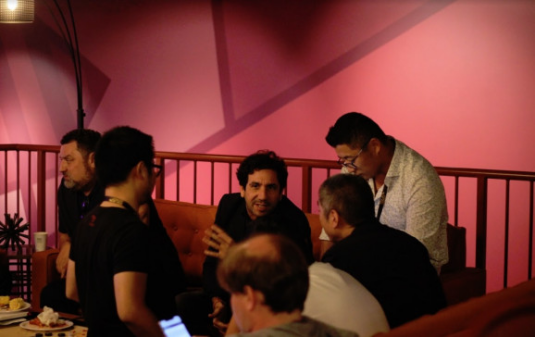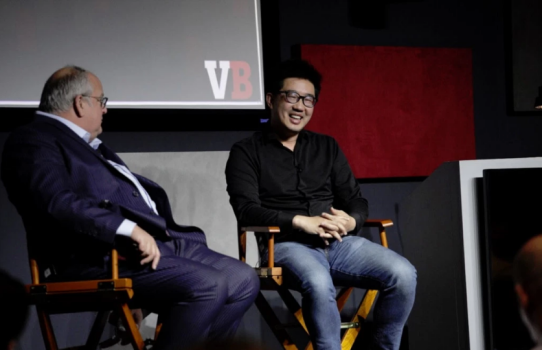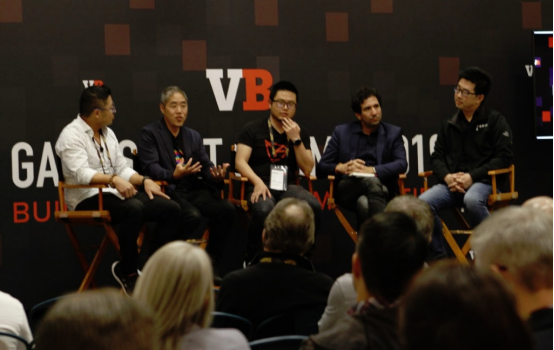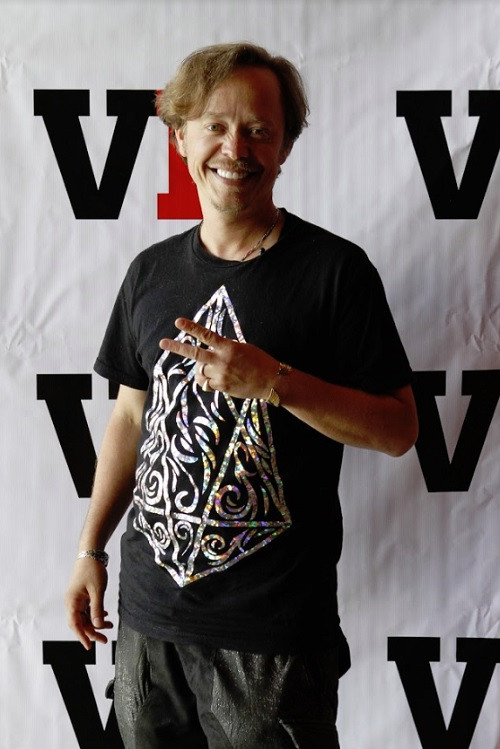Why are smart kids turning to blockchain games?
What qualities did the blockchain game attract to them?

Above: At the 2019 GamesBeat Summit, the blockchain team is having a lively discussion.
At the GamesBeat Summit in Los Angeles in 2019, we conducted an in-depth discussion of blockchain, cryptocurrencies, and games. Although we discussed it last year, the situation is different, and the game industry leaders who are involved in blockchain games have a higher reputation.
- Twitter featured: Coin's stolen 7000 bitcoin; EOS 4 billion dollars went "tracked"
- Dry goods: analysis of the DCC mining recovery from the calculation of the difficulty curve
- Babbitt Column | What are the risks of TEE-based projects?
However, people who are skeptical about this still exist, because cryptocurrency fraud is not uncommon. The blockchain "gold rush" also scared away many game developers who want to enter this field. And some people have come to the conclusion that "blockchain games are still too primitive" after studying games like crypto cats.
But game veterans who have studied this emerging market are excited about it. Today's difference is that more and more generations of famous game company leaders are exploring the blockchain.
Just this week, Microsoft invested a lot of cloud computing resources in blockchain research. Ubisoft is also active in blockchain games.
Some blockchain believers believe that blockchain will be the key to adventure games such as top players, metaverses, hackers or avalanches. And big game companies like Electronic Arts, Activision Blizzard and Take-Two Interactive are also on the sidelines.
Blockchain games are dazzling

Above: Blockchain Gold Rush at the 2019 GamesBeat Summit – Two Bit Circus
Mike Vorhaus interviewed Forte CEO and Kevin Chou, former CEO of Kabam, once the world's leading mobile gaming company. James Zhang (CEO of Concept Art House and partner of Fifth Era) hosts a blockchain game discussion group; and I and Brock Pierce (the chairman of the Bitcoin Foundation and the founders and contributors of many cryptocurrency startups) ) presided over the closing meeting.
Zhang's team includes Arthur Madrid, board member of Animoca Brands, Roy Liu, director of business development at Tron Foundation, Zhou Kaiwen, CEO of Forte Labs, and Miko Matsumura, co-founder of Gumi Ventures and co-founder of Evercoin Exchange. These team members announced plans to invest more than $230 million in blockchain games.
I will mention the key points at the meeting. I also interviewed Miko Matsumura. Randy Saaf, CEO of Lucid Sight, also spoke in the first session. All participants of the summit participated actively and were active.
Driving the new wave is his strength
Zhou Kaiwen was the first person to board the blockchain game stage and set the tone for this. He is fascinated by the combination of cloud-based mobile gaming and free-to-play economy, and has set off this wave in Kabam. Zhou Kaiwen said that the combination of new technologies and new business models has created "explosive innovation."
He says:
“The reason I love the gaming industry is that we are at the forefront of these new technologies and business models. There are many new things in the blockchain, from cryptography to decentralized computing, trust and immutability. Many technologies can be combined. Together. And we only touch on the new business model it brings."

Above: Zhou Kewen, CEO of Forte, and Mike Vorhaus, Vorhaus Advisors
Decentralization is a new economic model that does not use any central entity to make decisions, but rather relies on open source communities that are connected by tokens. No one can intervene. The encryption industry hopes that game companies can create more uses for tokens.
“I think this will be a truly fundamental change,” said Zhou Kaiwen, whose company, Forte, is building blockchain game engine technology that enables developers to easily implement blockchain integration.
Zhou Kaiwen said that the blockchain will one day enable players to transfer the creative assets of one game to another. But the peer-to-peer community will soon appear, and users can create content, own content, and sell it to friends in the community.
To some extent, the game's free play has been broken, many players are dissatisfied with this, and only a small number of paying players are concerned. Blockchain can dramatically improve this situation and make these economies better involved.
"In our Kabam game, when a player spends $10,000 in the game and the second player costs $5, and the third player doesn't spend anything but spends a lot of time, we have to find a balance game. Method," he said. “How do we balance? Over time, it will gradually evolve into a “paid win” situation. This is very bad, because this is not the way the real world economy works. And the blockchain has the opportunity to bring more How much balance. How do we design the game world and economy more like the real world economy?"
If this balance can be achieved, developers and players can become partners, not the opposite.
Roy Liu, head of business development at Tron Foundation, pointed out that Tron bought BitTorrent for $140 million last year and set up a $100 million Tron Arcade fund for Tron's blockchain games.
110 decentralized applications have been built on the Tron blockchain platform. He believes blockchain games will be successful in chance games, skill games, strategy games and simulation type games.
"In the end, it is still an economic issue," Liu said.
However, he was very happy that Zhou Kaiwen attended the summit because it was affirmation for these game veterans. Liu hopes that there will be more catalysts on the market.
“This is a big market with great potential,” he said.
He said games like Apex Legends and Fortnite have made the game more than $100 billion in turnover. But he hopes that the blockchain will make it more than $500 billion. One way to do this is to create more characters and gameplay for gamers so they can get involved and stick to it.
He said: "To be honest, we can also make games like the number one player."
Blockchain foundation
Matsumura talked about the blockchain foundation. He believes that cryptocurrency is an "open source currency." He said that about 10 years ago, when the Internet began to "print bitcoin," he studied it.
In 2017, Matsumura circumvented all the currency scams and cooperated with Japanese game company Gumi to set up a $30 million investment fund Gumi Cryptos.
He is very excited about this because he believes that the blockchain is a new way of recording history by establishing consensus and agreeing on what happened. This history can become open and immutable. It also includes these incentives to promote decentralization and digital scarcity.
"People don't understand how wonderful Bitcoin gamification will be," Matsumura said. “The game winner will be able to coordinate these incentives.”
This in turn will benefit the game economy.
Matsumura said:
"I think the most interesting part of Kevin's speech is that blockchain games have the potential to restructure the game economy. The free game economy is dysfunctional and crumbling, which is actually not healthy. And because the game industry itself is not healthy, the game industry has the opportunity to improve value. Flow. This is what I want."

Above: The blockchain game discussion group (from left to right) is followed by James Zhang, Miko Matsumura, Roy Liu, Arthur Madrid, and Zhou Kaiwen.
Matsumura believes that the potential energy of the blockchain is attributed to all capital investment. The game adds value, or gives the player a reason to play the game and be able to play for a long time in the new economy of the game world.
Randy Saaf of Lucid Sight talks about “collectible games” where players can get items in the game and once they get the items, they are owned by them. Similar to swap card games (such as Magic: The Gathering) with their own cards. Animoca Brands is also doing similar games.
Arthur Madrid, a board member of Hong Kong-based Animoca Brands, previously run Pixowl, and Animoca acquired the company for $5 million last year. Animoca is using blockchain technology to develop sandbox games like Minecraft. He believes that irreplaceable tokens that identify unique or rare items will have a huge impact on future blockchain games.
Zhang said: "I have not seen any better than Magic: The Gathering."
The mainstream market for blockchain games

Above: Two Bit Circus Field Map
While all of these ideas are interesting, Zhang asks how cryptocurrencies can be adopted on a large scale and how to promote mainstream adoption. These problems are a stumbling block to the development of blockchain games.
Matsumura believes that mobile communication networks such as Facebook Messenger, Line, Kakao and Telegram will introduce cryptocurrencies in the future, which will facilitate the large-scale adoption of cryptocurrency and blockchain games.
Zhou Kaiwen said that what is needed now is to create a platform that is very attractive to game developers. He believes that multiple blockchains will coexist as a platform for game developers.
“Why do developers have the blockchain and game integration as their top priority?” Zhou Kaiwen asked. "It all depends on the incentive adjustment. As a game developer, many times I don't want gamers to trade items with each other. For example, if I make a sword and the player is trading the sword, the sales of the sword will be low. ""
However, Zhou Kaiwen wants to attract developers by simplifying blockchain integration by investing $100 million, thus promoting the adoption of the mainstream blockchain.
Brock Pierce finale

Above: Brock Pierce intends to combine the game with the blockchain
Brock Pierce is the last speaker. He is a pioneer in virtual goods, digital video and social casino games. He raised more than $5 billion for the company he founded.
Pierce started to get into Bitcoin very early, and even when he dug Bitcoin early, he proved that the paper he had Bitcoin was lost.
But now he is hailed by Forbes as "blockchain billionaire."
I met him in 2012. At the time he operated a social casino gaming company, Playsino and Clearstone Global Gaming Fund. I remember that he was addicted to Bitcoin, and in 2013 he co-founded Blockchain Capital and invested in a number of blockchain startups.
In 2017, he became a shareholder and advisor to Block.one, and the company's first token issue (ICO) sold $700 million worth of EOS tokens. The current value of EOS tokens is approximately $4.9 billion. He is also an investor in Tether. Like EOS, Tether is one of the largest digital currencies in the $350 billion cryptocurrency market. Then in March 2018, he left Block.one.
Pierce said he has been closely watching all the scams and frauds in cryptocurrency financing. But he believes that blockchain and games will be brought together through business models, such as rewards for gamers or rewards for game developers. He compared the current era to the time when the iPhone came out, and now developers are just learning how to make iPhone games.
Pierce said:
“Early data is very important and everyone should pay attention.”
Most of the early games were very simple, such as encrypting cats. But Pierce said he wants massively multiplayer online games to integrate blockchain decentralization with different types of economies.
A few years ago, Pierce thought it was too early for game developers to care about the blockchain. But he thinks it's time to fund blockchain gaming companies and take advantage of the foundations they have laid.
For companies like EA, Matsumura said, "I don't think these companies will ever be able to catch up with this boom."
This article is translated by First Class
If reproduced, please indicate the source!
We will continue to update Blocking; if you have any questions or suggestions, please contact us!
Was this article helpful?
93 out of 132 found this helpful
Related articles
- Counting coins three times were hacked: Is Li Xiao really true?
- Currency security "monitoring self-stealing"? Don't let the hacker internally dispel the trust of the entire cryptocurrency
- Analysis of the market: the stolen and false is not known, the bad panic has formed
- Pan Weicheng founder Chen Weixing invested, Hummingbird mining machine released new hummingbird C7
- Under the double black swan, where is the coin circle?
- Market Analysis: On May 8th, the bookmaker is uncertain, and he is a rational little fan.
- Market Analysis: Bitcoin's new high of 6025 US dollars, trading methods at different time levels






